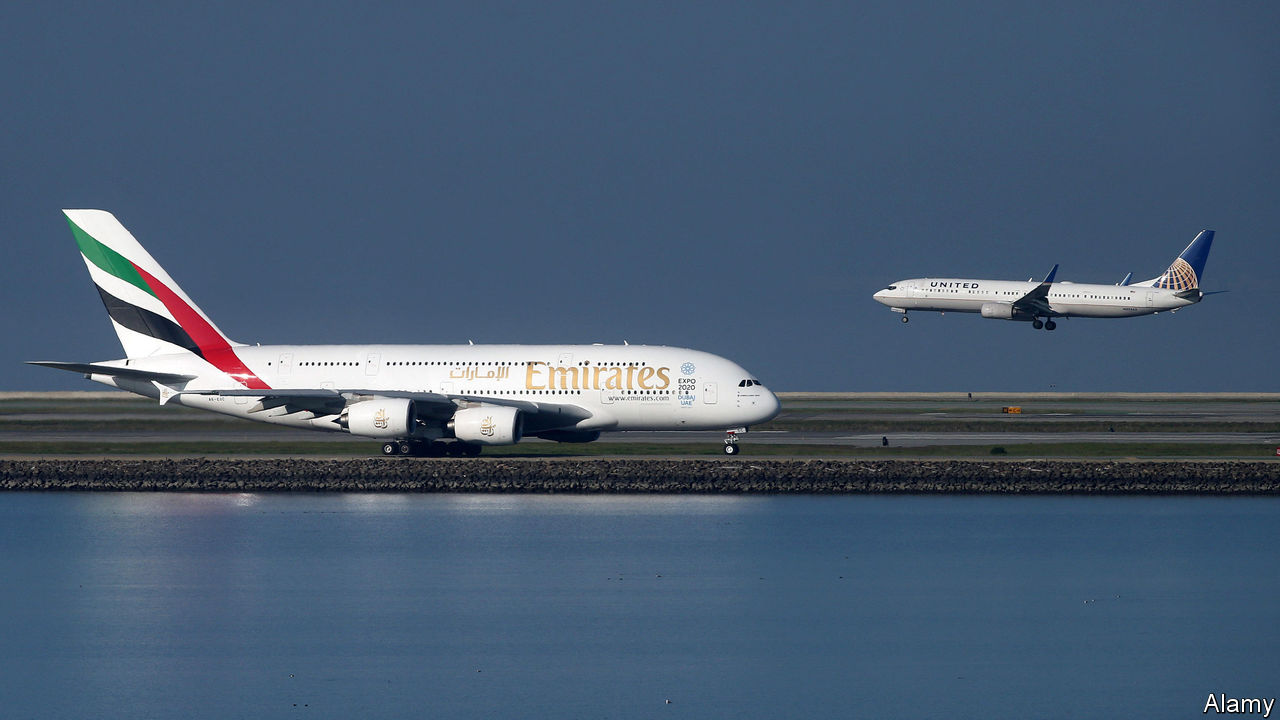
ON MAY 14th the United States and United Arab Emirates (UAE) announced a deal that should, at least in theory, put an end to their long-simmering dispute over what airlines in America allege are unfair subsidies provided by the Gulf state to its two major airlines. News of the agreement had emerged three days earlier, prompting both sides to claim victory. American representatives claimed that the UAE had admitted that it had unfairly subsidised its flag carriers and had agreed not to add further so-called fifth-freedom flights, which are routes to the United States that do not originate in the UAE. (Breitbart News ran a triumphant story under the headline “Trump’s America First Agenda Wins Trade Dispute With United Arab Emirates.”) Meanwhile, the UAE ambassador to the United States argued essentially the opposite, stating that he was “very pleased” that Emirati airlines could continue to add fifth-freedom flights.
-
Airlines in America fail in their campaign against the Gulf carriers
-
Tessa Jowell, Olympian politician
-
Artificial intelligence may change the way companies issue debt
-
Protests on Gaza’s border with Israel turn deadly
-
Libraries that speak loudly
-
Britain creates a more hostile environment for immigrants
So who is right? Mostly, the UAE side. When you look at the real substance of the agreement, it is clear that the American airlines did not get anything they wanted. The main thing they sought was to put an end to those fifth-freedom flights, which cut into their business when Emirates and Etihad, the flag carriers of the states of Dubai and Abu Dhabi in the UAE, fly from their home bases to the United States via places such as Europe. The American carriers got some language they could point to in order to declare victory: the Emiratis stated in the deal that they have no plans to add new fifth-freedom routes. But the American claim of victory rings hollow, because there is nothing to prevent Emirates and Etihad from making such plans in the future.
The Americans also claimed a win because the UAE airlines promised to publish yearly reports on their finances that are up to international standards. The American airlines hope this will force them to fess up to the unfair government subsidies that the Americans think keep their Emirati rivals afloat. But it is not clear that Emirates and Etihad will have to disclose much more than they already do. Emirates, for instance, already publishes annual reports that are prepared in accordance with International Financial Reporting Standards and are audited by PwC, a British accounting firm. And the Americans also hailed language in the deal to the effect that “government support…may adversely impact competition in providing international air transportation.” But not only is that language vague and meaningless; it is also contradicted by another line in the agreement:
The delegations stated that government support in whatever form—including policies, practices, and rules—is neither uncommon nor necessarily problematic in the global aviation sector.
The deal is similar to one struck between America and Qatar in January, which also averted the course of action the Gulf airlines most feared, namely a full renegotiation of the “open skies” treaties that allow them to fly freely between their home states and America. But in reality, despite making their case for years, the American airlines did not have much hope for a better outcome in these negotiations, because the substance of their claim against the Gulf carriers has always been lacking. Airlines in America have also enjoyed billions of dollars in various government subsidies over the years and it has always smacked of hypocrisy that they are taking aim at the Gulf carriers. The UAE deal gave the Americans just enough to allow them to declare victory and move on. But if this is what success looks like to American airlines, it is easy to understand why the service they provide remains so poor.
Source: economist
Airlines in America fail in their campaign against the Gulf carriers